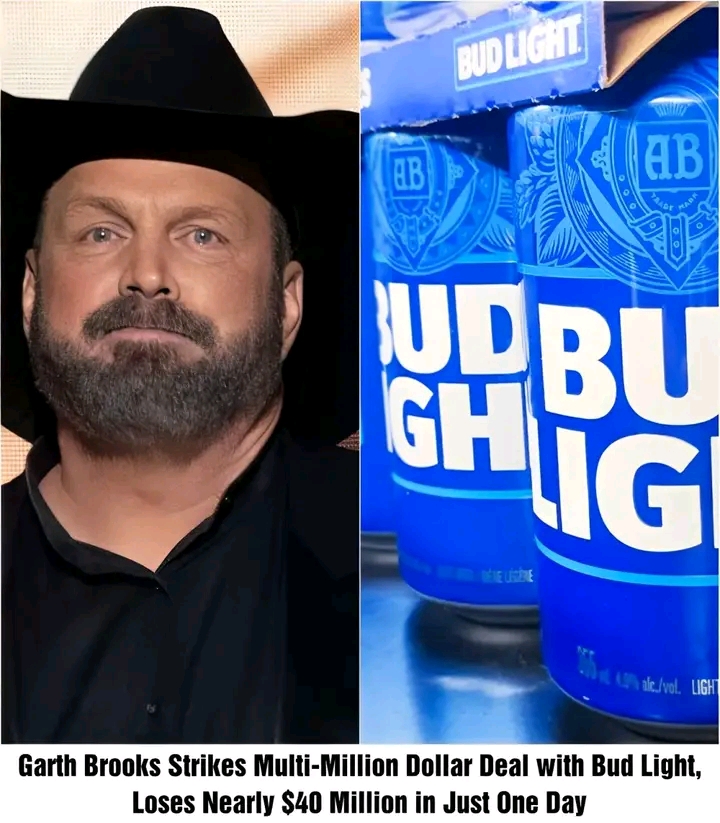CELEBRITY
Garth Brooks Strikes Multi-Million Dollar Deal with Bud Light, Loses Nearly $40 Million in Just One Day

In the rapidly evolving landscape of corporate partnerships and brand endorsements, the intersection of cultural movements and marketing strategies has become a contentious battleground. The recent partnership between Garth Brooks and Bud Light, and its subsequent fallout, offers a compelling case study into the complexities of modern celebrity endorsements, corporate identity, and consumer reaction in the age of social awareness and activism.
Garth Brooks, a figure synonymous with country music and American cultural iconography, entered into a high-profile endorsement deal with Bud Light, a brand that has increasingly aligned itself with progressive causes and inclusivity campaigns. This partnership came on the heels of Bud Light’s collaboration with Dylan Mulvaney, a transgender TikTok influencer, which itself sparked significant controversy and backlash from conservative segments of Bud Light’s consumer base. The criticism centered around accusations of the brand engaging in “woke” marketing practices, a term pejoratively used to describe companies that overtly align with progressive social issues.
The announcement of Brooks’ deal with Bud Light was met with immediate and widespread backlash, primarily fueled by a segment of his fan base and broader audiences who perceived both Brooks and Bud Light as championing “woke” ideologies. The criticism was not merely a reflection of the partnership itself but was deeply intertwined with the ongoing cultural and political debates surrounding identity, representation, and corporate involvement in social issues.
In the span of a single day, Garth Brooks witnessed an unprecedented $40 million erosion in his market value, a stark manifestation of the volatile nature of public opinion and the tangible consequences of perceived misalignment with consumer expectations. This financial hit underscores the risks associated with celebrity endorsements in an era where cultural affiliations and ideologies play a significant role in consumer behavior.
For Bud Light, the partnership with Garth Brooks, following the controversy with Dylan Mulvaney, represented a continuation of its engagement with socially progressive themes. However, the backlash highlights a critical challenge for brands attempting to navigate the complex terrain of “woke” culture. It reveals a growing divide in consumer expectations, where brands are often caught between advancing social progressivism and adhering to traditional values that resonate with a significant portion of their market.
The term “cancel culture” has become a pivotal aspect of the discourse, reflecting a climate where public figures and companies are quickly boycotted or supported based on their perceived political or social stances. The financial implications for Brooks and Bud Light illustrate the tangible impact of cultural and political affiliations on commercial success in today’s highly polarized environment.
The fallout from the Bud Light and Garth Brooks partnership signals a need for a reevaluation of how brands engage with cultural and social issues through their marketing strategies and endorsements. It poses critical questions about the balance between corporate social responsibility and consumer expectations, and the role of celebrities and influencers in navigating these waters.
For artists like Garth Brooks and companies like Bud Light, the path forward involves a delicate balancing act. They must navigate the expectations of a diverse consumer base while staying true to their values and the causes they support. This incident serves as a cautionary tale about the complexities of aligning brand and personal identities with social movements and the unpredictable nature of public response.
The controversy surrounding Garth Brooks and Bud Light’s partnership reflects broader societal debates and the challenges faced by brands and public figures in engaging with “woke” culture. It underscores the importance of understanding and anticipating the diverse reactions of consumers in a landscape increasingly defined by social and political activism. As the dust settles, the lessons learned from this episode will undoubtedly shape future strategies for celebrity endorsements and corporate social initiatives, highlighting the need for nuanced approaches in a divided cultural climate.












